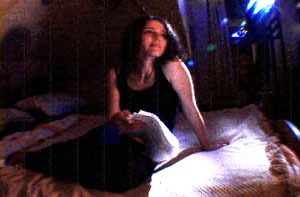
Can-Can Attitude
Written by Amanda Axelson | Posted by: Anonymous
Lulu Wang is proof that sometimes your career finds you. Although she didn’t start out as a film major, she certainly caught on quickly. In her senior year at Boston College, only shortly after becoming interested in directing, she won the coveted Best Picture Award at the BC Baldwin Awards.
The Boston College Baldwin Awards is a red carpet awards ceremony for excellence in film and video. Any student who attends Boston College is encouraged to submit. The panel of judges is comprised of the schools prestigious fine arts and communications departments. The Best Picture category gets an additional screening at the Boston College Arts Festival. Many students strive to achieve this award, but only films like Lulu’s Pisces, get to take home the prize.
Winning Best Picture was a spring board for LuLu to work on other film projects. She even spent time in Chirqui, Panama, to write and direct a 30-minute documentary about the declining fishing industry. But it’s her latest project, Can Can, that caught NewEnglandFilm’s attention.
Can Can, is based on a short story by Massachusetts author Arturo Vivante. After learning of LuLu’s interest, Arturo Vivante sat down with her to discuss his vision. We had the honor of learning about Lulu Wang, her latest project, and why she should be considered a true New England filmmaker.
Amanda Axelson: I know you’re a Boston College alumnus. What did you study there?
Lulu Wang: I was actually an English major at BC. I mostly studied creative writing and didn’t discover the film department until my senior year. I took two film production courses during my senior year and made a few short films.
AA: Can you elaborate on your experience with the Baldwin Awards?
Wang: Last year was the first annual Baldwins and I received the Best Beginning Film Award with Tony Hale for our project, Storyteller. It was one of my first films, shot with a little super-8 camera, and edited by hand, so that was very encouraging.
AA: Can you tell me about your Best Picture win? Would you say that encouraged you to start on your next project?
Wang: Yes, we won Best Picture for the film Pisces. I was the writer/director and one of the producers for the project. I originally wrote the script for a class assignment, but it didn’t get chosen as one of the scripts to be produced. One of my classmates, Jeremy Kaplan, came up to me after class and said that he really loved the script and that if I was up for it, he’d produce it with me outside of class. We started looking for crew and I really didn’t know anyone in the film department since I wasn’t a major or minor. I had been watching some BC films from the previous year and was really impressed with Elaine Mak’s cinematography, so I emailed her. She had already graduated, but liked the script and agreed to DP. Most of us were barely acquaintances, much less friends, before the film and I had never directed a crew before! This might sound a little cliché, but we just came together because we shared a vision and wanted to pursue it. I started my project Can-Can before winning the Baldwin this year, but the awards definitely gave the whole crew a boost of confidence.
AA: Can you tell me more about the film and who Arturo Vivante is?
Wang: Can-Can is a short film that will be shot on HD, at the Cape this fall. It is a story that explores marriage and infidelity from three different perspectives. Arturo Vivante is the author of the original short story, which was only a page and a half long!
AA: What sparked your interest in this man? And how do you plan to keep true to his story?
Wang: Last summer I wanted to get some experience adapting a screenplay so I went to the bookstore and flipped through lots of short fiction collections. For whatever reason, Arturo’s story really struck a chord with me and I didn’t realize it until a few days later when I found myself thinking about it on the train. I immediately went back to the bookstore, found the story, and wrote a first draft. Then, I did what all savvy Internet users do today, and googled his name. Coincidentally, it turned out that he retired right in Wellfleet, MA so I called him up. The project got put off for a while this past fall because I was directing a documentary in Panama, but as soon as I got back, I paid Arturo a visit and we discussed his vision and how I could stay true to that. He had his Wellfleet house in mind when he wrote the story, which is why we’d like to shoot there. The story itself is quite simple and subtle, but there is a certain tone and mood to the piece that I really hope to lay out. I added a bit of dialogue to the script, which wasn’t in the original story, and a lot of visual details, but otherwise, I think the story stays pretty true.
AA: I know you said you were shooting at the Cape. How far along are you in making that happen?
Wang: We have received a pretty good response from the Cape Cod community. A few local companies are sponsoring us by delivering products to the set, and the Arts Foundation of Cape Cod has been incredibly supportive and helpful. I hope the film will be able to capture the quaint charm of the Cape and also highlight Arturo Vivante’s work. As far as making the project happen in general, we are still in pre-production, finishing up fundraising and casting and all that. Since we are recent graduates with a ton of student loans, I was hoping to find outside investors. It’s been hard, but surprisingly successful. It felt very weird at first, to ask strangers for money, but after a while, I realized that I just had to be frank. "Hi, my name is Lulu. I’m a filmmaker. I need to raise money for my movie. Whatdya say?"
AA: You plan on shooting in HD. Is this the first time you will be shooting in HD? What made you decide to shoot in HD and do you prefer HD? Is it something you learned at BC?
Wang: I really prefer film over video, but I’ve heard a lot of good things about HD –mainly that you can get a nice look with less than half the cost of film. This is the first time I’ll be shooting on HD and none of us learned it at BC so we’ll all be learning together as we go along. That’s always the fun of it!
AA: How has being a BC alum helped you with your prior films and the new one?
Wang: I met some very talented people at BC and we’re all willing to help each other out as we work in the industry, whether that means working on each other’s projects or with networking. The film department was great because it was so small and intimate. I really learned a lot in a short period of time. John Michalczyk, the chair of BC’s Fine Arts department, has been so supportive even after I graduated, often sending me work and feeding me! I still stay in contact with quite a few other professors… Tom Kaplan-Maxfield for example, was a writing professor and has been a tremendous mentor for me. He is always willing to read my writing to offer critiques and he made a very generous contribution to Can-Can, when I told him about the project. More than anything else… it’s very inspiring to know I have such good friends behind me.
AA: Is there anything else we should know about you? Any advice for novice filmmakers?
Wang: I recently took on a great motto from the Google guys: "Have a healthy disregard for the impossible."
For more information on Lulu Wang and her new film, Can-Can, please visit, www.thumbelulu.com/cancan. For more information on The Boston College Baldwin Film Festival, please visit, www.bc.edu/baldwin.









